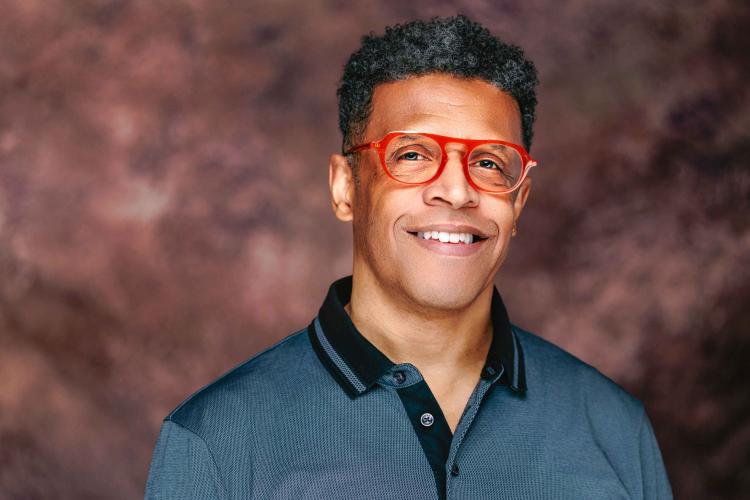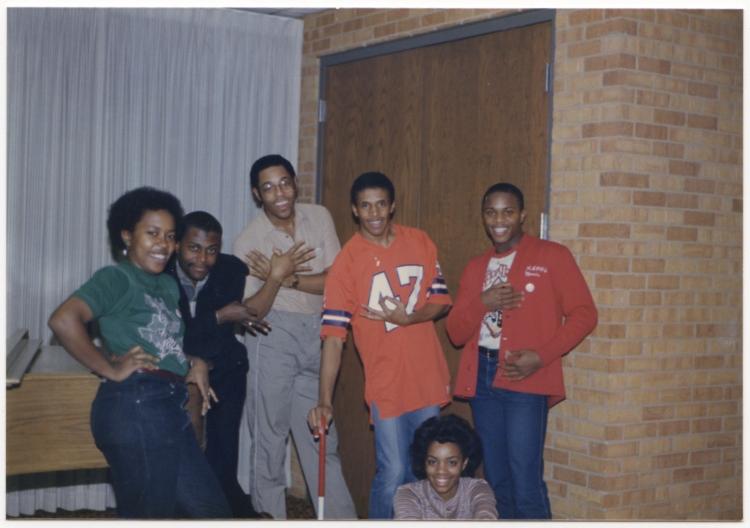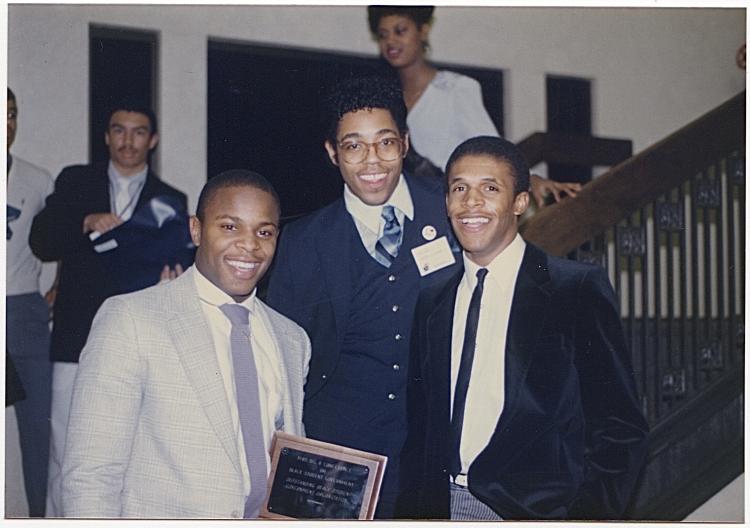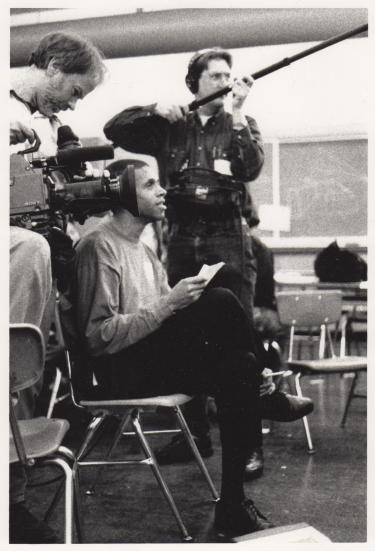Forever Buffs Impact: Q&A With Harold Abrams (Comm ’85)

From storytelling in blue books to interviewing Stevie Wonder, Forever Buff Harold Abrams has used storytelling as a positive force to spotlight the voices of Black and LGBTQI+ communities, as well as other people of color. Representation matters, a sentiment that Abrams has dedicated his career to celebrating through his roles as a screenwriter, producer and artist. Committed to celebrating diverse experiences, Abrams works to uplift these communities through powerful and purpose-driven media.
A two-time Emmy Award-winning producer, Abrams has brought compelling stories to screens nationwide, like “New Year’s Eve Dance Marathon,” MTV, and “Michael Jackson: Making History,” VH1. His work reflects a deep commitment to social impact, as seen in “World AIDS Day,” VH1, “Foster Care,” PBS, and “Teens and Gun Violence,” PBS. He also serves as Project Director for the National LGBTQI+ Cancer Network, continuing his mission to create lasting change.
Read on to learn how Abrams found his voice in the ’80s and turned his passion for storytelling into a lifelong purpose.
What brought you to CU Boulder?

Like many schools at the time, CU Boulder was making a strong effort to recruit Black students, and I had the opportunity to participate in a summer program that allowed me to live on campus and take courses. That experience helped me see how I might thrive there. I was especially drawn to the communication and journalism programs, and I’m glad I chose to major in communication — it set the stage for so much of what came next.
How would you describe your experience as a CU student in the 1980s?
Attending CU was a huge shift for me. I came from a small parochial school in Denver with 88 students in my graduating class, so landing on a campus of over 25,000 students was a bit shocking. Everything felt bigger: the lecture halls, the energy, the range of people and ideas.
One of the most formative aspects of my college experience was meeting a tight-knit group of students from New York City. They were vibrant, well-traveled and talked about the world in ways I hadn’t considered before. Their presence opened something up in me — and ironically, though New York wasn’t on my radar back then, it’s now been my home for over 30 years.
CU Boulder was also a space where I encountered the complexity of my identities. As a Black student, I often found myself one of the only people of color in the room — an experience that was isolating at times. One of the ways I found community was through Kappa Alpha Psi, the historically Black fraternity where I served as chapter president. That brotherhood grounded me and even extended into campus life — especially around sports, which were a big part of the CU culture. I had fraternity brothers on the football and basketball teams, and going to games was always a highlight.
Looking back, I also carry a sense of what was missing. For many students, college is a time of self-discovery, but in the 1980s, being out as queer wasn’t widely accepted. I spent those years as much in suppression as in exploration. I sometimes wonder who I might’ve met or become had I been able to live more openly on campus. I loved CU, but that regret is part of my story, too.
My time at CU was full of contradictions — overwhelming and expansive, exuberant and complicated.
How did your involvement with the Black Student Alliance and the Black Voice newspaper influence your path after graduation?
Serving as treasurer of the Black Student Alliance and founding editor of The Black Voice were formative experiences that allowed my leadership skills to flourish. Both roles allowed me to bring people together — whether organizing events, facilitating conversations about campus life and racial equity, or helping others express their talents and perspectives.
As a communication major, creating The Black Voice was especially meaningful. Before launching the paper, I had written editorials for the Colorado Daily, but I wanted to establish a dedicated platform where Black students could share their stories, opinions, and experiences in their voices. Turning that idea into reality is something I’m still proud of — it brought visibility and connection to our community. I’ll never forget the buzz around our first issue, launched at an event in the Williams Village dorms; the turnout was incredible.

That experience was a clear precursor to my professional path. After graduation, I continued writing and had letters to the editor published in People, Entertainment Weekly, Vibe, W, and Vanity Fair. As a supervising TV producer, I’ve created content that highlights culture, entertainment and issues impacting Black communities and people of color.
My time with those student-led initiatives at CU taught me how to build something meaningful from the ground up — a skill that’s shaped my entire career.
How do you infuse passion, creativity and celebrate diverse voices through your work in entertainment and advocacy?
For me, passion has evolved into purpose. Whether I’m producing television or managing advocacy projects for a nonprofit, my focus remains the same: to celebrate and center diverse voices, and to create meaningful work that reflects the world we live in.
As a Black gay man, I understand firsthand the power of visibility and the importance of being seen, valued, and heard. That lived experience drives me to ensure that the voices of marginalized communities are not only included but are central to the stories being told.
In both entertainment and advocacy, I work intentionally to build inclusive teams, conduct thoughtful research, and approach each subject with care and nuance. I’ve learned that even the most specific or personal stories can carry universal themes — when told honestly and with integrity, they resonate far and wide.
Over the years, I’ve had the privilege to lead projects that speak to that mission — from producing segments on PBS featuring foster youth navigating the system, to interviewing Stevie Wonder about the importance of Black History Month, to documenting the cancer journey of a nonbinary trans femme person amidst a wave of anti-trans legislation. These moments remind me why I do this work.
Representation matters — and I’m committed to creating space for it, every step of the way.
What accomplishment are you most proud of in your personal or professional journey?
Winning my second Emmy Award stands out — not just for the recognition, but for what it represented. It was the result of a team coming together with heart, skill and a shared sense of purpose to fulfill VH1’s mission and bring awareness to the ongoing impact of HIV and AIDS in the entertainment community and beyond.
At the time, I pitched my supervisor a series of segment ideas highlighting musicians, political advocates, members of the Broadway community and everyday people affected by HIV and AIDS. Not only did he support the vision — he greenlit an entire special. From there, I found myself walking the halls of VH1, asking already-overloaded producers and staff if they could take on one more project. I’m grateful for those who said yes.
The special we created became the first VH1 program to ever win a National Emmy. More than a career milestone, it was a powerful reminder of what can happen when people unite around a story that truly matters.
What is your advice to Buffs of all industries who aim to turn their voice into impact?
The most important part of making an impact has been staying connected to who I am and why I do the work. That sense of purpose — your why — should align with the mission behind what you're building, creating or contributing to. Whether it’s protecting lives, creating joy, making change, or building something sustainable, when your work reflects your authentic self, it resonates more deeply and reaches further.
Early in my career, I was a producer on a television series called In the Mix, which we often called 60 Minutes for teens. While the show covered a wide range of topics, I was drawn to producing segments that tackled serious, issue-driven subjects — like foster care, eating disorders, legal rights, and gun violence. Those stories might not have been the buzziest, but they meant something to me. They were rooted in empathy and a desire to help someone feel seen or informed. That was — and still is — my way of using my voice for good.
So, for me, the key has always been leading with heart, working with intention and staying open to growth. When you bring your full, honest self into your work, that’s where the real impact begins.
What brings you the most joy in your work as Projects Director for the National LGBTQI+ Cancer Network?
What I value most in my role is the opportunity to lead a range of projects that all align with the Cancer Network’s mission of education, training, and advocacy, each aimed at supporting LGBTQI+ communities across the cancer continuum.
One area that stands out is overseeing our cultural competency training for healthcare providers. Helping them build safer, more affirming environments for LGBTQI+ patients —especially trans and nonbinary individuals — is meaningful work. Many providers haven’t received guidance on how to care for queer communities, so being a resource in that space makes a real difference.
It’s also great to support my team — understanding what motivates them, nurturing their strengths, and creating opportunities for growth. And throughout all of this, storytelling remains a powerful part of my work. I’ve been able to use my background as a producer to document and uplift the voices of queer individuals navigating cancer. Sharing these stories is one of the most impactful ways we connect community experiences to broader change.
Is there a project you're currently working on that you're especially excited about?

I’ve been expanding into narrative storytelling after years in documentary TV. My original drama series, Grave Affairs — about a funeral planner navigating the death industry — won the SeriesFest TV Festival and was featured in a live reading for their 10th anniversary. I’m currently writing my first feature, Crushed, about a TV producer returning home to confront his past. I’m excited to share both projects with festivals and production partners.
What does it mean to be a Forever Buff?
Being a Forever Buff means carrying the spirit of CU Boulder with me — in my work, my values, and my identity. The campus gave me a sense of possibility, and the foundation I built there continues to shape my personal and professional journey. I still wear CU gear with pride, stay connected through newsletters, and always light up when I see that buffalo logo. Living in New York, I’ve had the chance to meet with visiting faculty and fellow alumni from the College of Communication, Media, Design and Information.

